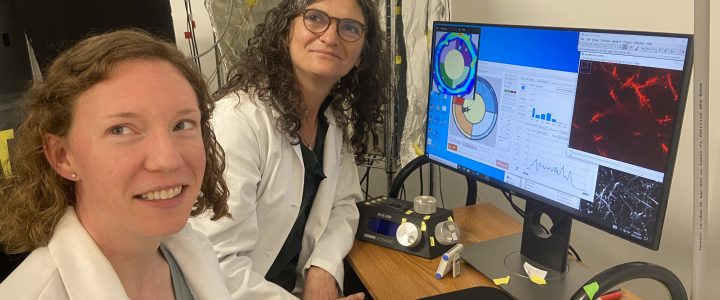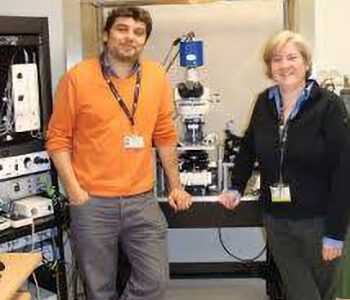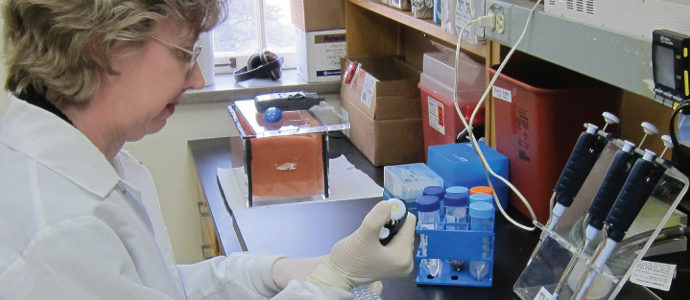A new treatment target for Fragile X syndrome has emerged from multiple research labs and a pharmaceutical startup. Neurolixis, a FRAXA pharma partner, has announced a new Fragile X development program.
Read moreseizure
Pharmacologically Activating mGluR7 as a Novel Therapy for Fragile X Syndrome

Join Dr. Tsai and Dr. Kumar on a journey into novel treatment avenues for Fragile X syndrome. Learn how activating mGluR7 could be a game-changer, opening up uncharted therapeutic territory.
Read moreAstrocyte Contribution to Sensory Hypersensitivity in Fragile X Syndrome

Most Fragile X research has focused on one type of brain cells: neurons. But mounting evidence point to problems with astrocytes, star-shaped cells which are vitally important to normal brain function. This team is working to understand how astrocytes are involved in Fragile X and develop treatment approaches that targets astrocytes alone.
Read moreSlack Potassium Channel Inhibitors to Normalize FMR1 Knockout Mice

Learn how a $100,000 FRAXA research grant supports Yale researchers in using Slack potassium channel inhibitors to treat Fragile X syndrome by normalizing behaviors in FMR1 knockout mice.
Read moreValidating Novel Inhibitors of ERK Signalling to Treat Fragile X Syndrome

One promising treatment approach for Fragile X syndrome is to inhibit on a neuronal pathway, ERK. ERK inhibitors are also being studied as treatments for other disorders including autism.
This team has conducted pilot studies showing that ERK inhibitors are very effective in reversing signs of disease in Fragile X mice. With this grant from FRAXA they will take the next steps toward possible clinical trials of an ERK inhibitor for individuals who have Fragile X syndrome.
Functional and Genomic Characterization of Interneurons in the Fmr1-KO Mouse Brain

The brain’s balance is maintained by two types of neurons: those that excite and those that inhibit activity. Like yin and yang, this balance is essential. This team has found fewer than normal inhibitory cells in the brains of Fragile X mice. They are now working to pinpoint this abnormality and find ways to restore the normal balance and function.
Read moreTargeting Serotonin 1A Receptors in Fmr1 Knockout Mice

Dr. Canal has discovered a promising treatment approach for Fragile X syndrome: new compounds which specifically and potently boost serotonin in the brain. The target is the brain’s serotonin 1A receptor.
Read moremRNA Therapy for Fragile X Syndrome

Dr. Kathryn Whitehead, Associate Professor at Carnegie Mellon University, helped develop the revolutionary science behind the COVID-19 vaccines. With a $103,000 grant from FRAXA, her team will now adapt this technology to deliver the missing Fragile X protein, to treat people who have Fragile X syndrome.
Read morePromising Results of Preclinical Study of ANAVEX®2-73

We are excited to share that Anavex Life Sciences announced today that preclinical data of the ANAVEX®2-73 (blarcamesine) study in Fragile X syndrome were published in the peer-reviewed journal, Scientific Reports.
Read morePreclinical Testing of High Fat/Low Carb Diets in Fragile X Mice and Cells

With a $90,000 research grant from FRAXA, Dr. Cara Westmark’s team will use mice to determine if more palatable Atkins-type diets can improve sleep and boost learning skills for those with Fragile X syndrome.
Read moreCellular-Specific Therapeutic Targeting of Inhibitory Circuits in Fragile X Syndrome

Studies have shown that the function of inhibitory networks is disturbed in Fragile X. This abnormality is not well understood but appears to be secondary to abnormalities in metabotropic glutamate and endocannabinoid systems. With a $90,000 grant from FRAXA, Dr. Molly Huntsman’s team examined how these networks interact and how inhibitory deficits can best be remedied.
Read moreIntegrating Human and Mouse Studies in Fragile X Syndrome – an NIH Center Approach

Presentations by:
Craig Erickson – Translational medicine and mechanistic studies of brain neurophysiology in Fragile X Syndrome: A NIH Center Overview
Ernest Pedapati – Network Mechanisms, Biomarkers, and Pharmacology of Fragile X Syndrome in Humans
Devin Binder – Network Mechanisms of Neurophysiology and Behavior in mouse models of Fragile X Syndrome
Kimberly Huber – FMRP Regulation of local and long-range neocortical circuits in the mouse: Links with EEG phenotypes
Bryostatin-1 in Long-term Use Seen to Arrest Fragile X Symptoms in Mouse Model

Long-term, but not short-term, treatment with bryostatin-1 — Neurotrope’s lead investigational therapy — arrested such behavioral and cognitive symptoms as hyperactivity, difficulties with daily life activities, and learning and memory deficits in a mouse model of Fragile X syndrome.
Read moreAuditory System Dysfunction and Drug Tolerance in the Fragile X Mouse

FRAXA Research Foundation has awarded $90,000 over 2019-2021 to principal investigator Dr. Jay Gibson and postdoctoral fellow Dr. Andrew Holley at the University of Texas Southwestern Medical Center. They are investigating circuit mechanisms for auditory system dysfunction and drug tolerance in the Fragile X mouse model.
Read moreMechanisms and Biomarkers of Sensory Hypersensitivity in the fmr1 Knockout Mouse

In this Fragile X research webinar we hear from Devin K. Binder, MD, PhD, Professor, University of California at Riverside Medical School and Khaleel Razak, PhD, Professor, University of California at Riverside as they present about Mechanisms and Biomarkers of Sensory Hypersensitivity in the fmr1 Knockout Mouse.
Read moreScientists Find a New Way to Reverse Symptoms of Fragile X

FRAXA Investigator and MIT Professor Mark Bear and his colleagues have identified a valuable new target for Fragile X therapeutics: GSK3 alpha. Several FRAXA research teams previously identified GSK3 beta as a treatment target for Fragile X. The catch is that, so far, GSK3 beta inhibitors have proven too toxic for regular use. Dr. Bear’s new discovery opens up the possibility of developing more selective compounds with less toxicity and fewer side effects. Interestingly, lithium inhibits both GSK3 versions – alpha and beta.
Read moreKetogenic Diet Eases Symptoms in Fragile X Male Mice

The Westmark laboratory continues to study sleep and rest-activity cycles in Fragile X mice as a potential outcome measure that correlates between preclinical and clinical research. The analysis of sleep EEG in the mice has proven more labor intensive than they anticipated, but the team is collaborating with Dr. Rama Maganti’s laboratory at UW-Madison on the development of computer scrips to speed up the analysis.
Read moreLess Active Immune System Evident in Fragile X Patients, Study Suggests

People with Fragile X syndrome are more likely to develop infections, but are less susceptible to autoimmune disorders than the overall population, a new study found. Taken together, this suggests that the immune system is underactive in this patient population. The study, titled, “The phenotypical implications of immune dysregulation in Fragile X syndrome,” was published in the European Journal of Neurology.
Read moreGanaxolone Fragile X Clinical Trial Showed Disappointing Results

Ganaxolone, an experimental drug from Marinus Pharmaceuticals which targets GABA receptors, did not show promise for Fragile X syndrome in a clinical trial.
Read moreDrug Duo Delivers Brain, Behavioral Benefits for Fragile X Syndrome

Administering a cholesterol drug alongside an antibiotic eases atypical behavior and restores the signaling balance in the brains of people with fragile X syndrome.
Read moreNKCC1 Inhibitor Bumetanide Corrects Synaptic and Circuit Hyperexcitability in Fragile X Mouse Model

With $258,000 in grants since 2013 from FRAXA Research Foundation, Dr. Anis Contractor and Dr. Qionger He at Northwestern University are exploring the potential of the available drug bumetanide to correct altered GABA signalling in a mouse model of Fragile X syndrome.
Read moreTetra Discovery Partners Initiates Phase 2 Trial of BPN14770 in Fragile X Syndrome

This 2-Period Crossover Study of BPN14770 is accepting adults males with Fragile X syndrome at Rush University Medical Center in Chicago. Principal Investigator of the study is Elizabeth Berry-Kravis, MD, PhD.
A selective inhibitor of the phosphodiesterase type-4D (PDE4D), BPN14770 has shown the ability to improve the quality of connections between neurons and to improve multiple behavioral outcomes in the Fragile X mouse model.
Pharmacological Tolerance in the Treatment of Fragile X Syndrome

With a $90,000 grant from FRAXA Research Foundation over 2018-2019, Dr. Patrick McCamphill, postdoctoral fellow in Dr. Mark Bear’s lab at Massachusetts Institute of Technology (MIT), is investigating drug tolerance to mGluR5 antagonists, arbaclofen, and other potential Fragile X treatments. He is also exploring ways to overcome it.
Read moreFRAXA Research Grants Drive Big Investments in Fragile X

Most people know that FRAXA supports academic research at many institutions such as Harvard University, University of Pennsylvania, Massachusetts Institute of Technology, and Yale University. However, FRAXA is also working with more than 30 pharmaceutical companies around the world. Mike spends a lot of his time advising and collaborating with industry partners.
Read moreNewly Discovered Regulatory Pathways in Fragile X

Studies at Yale University and elsewhere are showing that FMRP plays a significant role in the regulation of potassium channels. Looking forward, potassium channel opener drugs could rescue some symptoms of Fragile X in humans.
Read more
